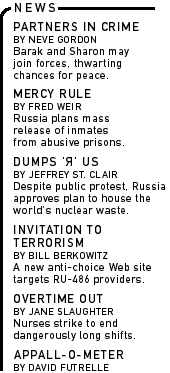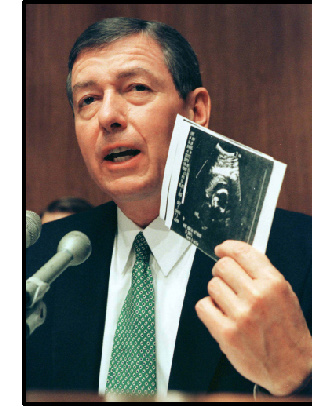

|

|

|

|
| |
|
|
|
The early reviews are in on the new George W. Bush administration. It has all the elements of the classic horror story: a predictable plot, familiar villains and an unshakable sense of déjà vu. On the following pages, we take a look at Bush's nominees and appointments, a diverse cast of characters in every way but ideology. Left to their own devices, this collection of unrepentant cold warriors, anti-choice extremists, Wise-Use desperados and corporate shills (as well as a couple of reasonable old-fashioned conservatives) could make for a harrowing next four years. Can the forces of good thwart this evil plan? Well, as In These Times went to press, thousands of townspeople were taking their torches to Washington to protest Dubya's inauguration, making one thing clear: There will be no honeymoon! Craig Aaron
In 1992, I was covering the Republican National Convention in Houston when I found myself, along with a handful of other hacks, in a room where a few dozen self-described "evangelical conservatives" had gathered. As a colleague and I walked in, the meeting had already commenced, and a prayer circle was underway. As is often the case in these settings, the exhortation to the Almighty wasn't brief. I
I blinked in amazement; a glimpse toward my colleagues confirmed that I had not imagined it. "Who the hell is this guy?" I asked one. "That's John Ashcroft, the governor of Missouri," someone replied. After the session broke up, I rushed for the governor and asked him if he was planning on making his prayer for the media a staple of his repertoire, as I was sure it would only endear him to the to the Fourth Estate as a sagacious politician worthy of respect and relevance. He shot me a look in response that I can only describe as un-Christian and skulked away. After that experience, I was inclined to dismiss Ashcroft as a sort of droll walking malignancy, a comical melanoma on the already-diseased American body politic. But as I watched Ashcroft come to Washington and ascend courtesy of the fiscal aid of religious conservatives (as well as the liquor and tobacco lobbies) my amusement gave way to grave foreboding. With his every act, his every utterance, I found myself replaying that moment in Houston and shuddering. For Ashcroft, I now fully appreciate, there is no distinction between serving the public and serving his particular Jehovah. And that particular Jehovah seems to think that anyone else who disagrees with his apostle is in need of some sort of re-education. It would be one thing if the ex-Senator (who I hope appreciates the irony of being defeated by one who died but lived on in the hearts of a majority of Missourians) was being dispatched to some minor department where he could make only so much trouble. But when one considers the likelihood of journalists facing an Americanized version of the Official Secrets Act (approved by both houses of Congress, vetoed by Clinton, but expected to come up again), Ashcroft's 1992 comments portend a particularly open interpretation that does not bode well for the free press clause of the First Amendment. Indeed, despite his assertion that he will act as a "guardian of liberty and equal justice" in the service of the "rule of law," which he defines as something that "knows no class, sees no color and bows to no creed," his characterization of those judges who hold that a woman's legal right to choose an abortion to be constitutional as "judicial despots" gives one pause. And from his new perch, there's no doubt he would throw the full weight of the Justice Department behind one of his more insidious assaults on the First Amendment, the "charitable choice" program he slipped into the draconian 1996 Welfare Reform Act. Referred to by the decidedly bland and nonpartisan National Journal as perhaps "the biggest blurring of the lines between church and state in many decades," this little gem of a provision essentially gives federal money to any faith-based organization to provide whatever services it wants to the poor, addicted and afflicted, with a license to proselytize. Several legal challenges are underway, given the program's blatant violation of the establishment clause, yet Ashcroft's congressional allies have been trying to expand "charitable choice" from social services to faith-based education programs as well. Conventional wisdom in Washington holds that Ashcroft is in for
a bruising, if not bloody, set of confirmation hearings, but that
he'll emerge as attorney general in the end. If he does fail on
the Hill, however, it's entirely possible he'll have another role
in the Bush administration. If Bush decides to initiate a rapprochement
with Iran-- providing he can find it on the map--Ashcroft would
be the perfect special envoy. Doubtless the mullahs would find Ashcroft's
brand of conservatism endearing.
|


